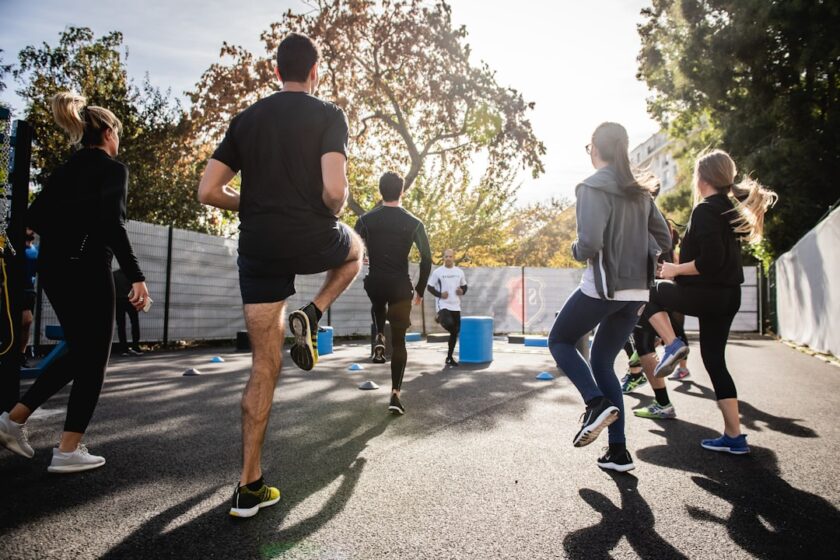Understanding Fitness: An Introduction
Fitness is a multifaceted concept that encompasses physical health, mental well-being, and overall lifestyle choices. It involves engaging in physical activities that enhance strength, stamina, flexibility, and cardiovascular health.
Frequently Asked Questions
1. What is fitness?
Fitness refers to the state of being physically healthy and strong, as well as the ability to perform daily activities with ease. It includes several components:
- Cardiovascular Endurance: The heart and lungs’ ability to supply oxygen during prolonged physical activity.
- Muscular Strength: The amount of force a muscle or group of muscles can exert.
- Muscular Endurance: The ability of a muscle group to perform repeated contractions over time without fatigue.
- Flexibility: The range of motion available in a joint or group of joints.
- Body Composition: The proportion of fat to lean mass in the body.
2. How do I start a fitness routine?
Starting a fitness routine can be an exciting journey! Here are some steps to help you get started:
- Set Clear Goals: Define what you want to achieve. Whether it’s weight loss, muscle gain, or enhanced endurance, having clear objectives is crucial.
- Choose Activities You Enjoy: Select exercises that you find enjoyable to ensure you stick with them. Options include running, swimming, weightlifting, yoga, or team sports.
- Create a Schedule: Incorporate your workouts into your weekly schedule to establish a habit. Aim for at least 150 minutes of moderate aerobic activity each week.
- Start Slowly: If you’re new to exercise, begin with shorter sessions and gradually increase the intensity and duration.
- Track Your Progress: Keep a fitness journal or use apps to monitor your workouts and celebrate milestones.
3. What should I eat for fitness?
Nutrition plays a vital role in supporting your fitness journey. Here are some dietary tips:
- Balanced Diet: Include a mix of carbohydrates, proteins, and healthy fats in your diet. Whole grains, lean meats, fruits, vegetables, and nuts are excellent choices.
- Pre-Workout Nutrition: Consume a meal or snack rich in carbohydrates and moderate in protein about one to three hours before exercising.
- Post-Workout Nutrition: Refuel with a meal containing protein and carbohydrates within 30 minutes after your workout to aid recovery.
- Stay Hydrated: Drink plenty of water before, during, and after workouts. Proper hydration supports performance and recovery.
4. How often should I exercise?
The American College of Sports Medicine recommends:
- Aerobic Activity: At least 150 minutes of moderate-intensity or 75 minutes of high-intensity exercise per week.
- Strength Training: Engage in strength training for major muscle groups on two or more days per week.
Remember, rest days are also important to allow your body to recover.
5. What are the benefits of regular exercise?
Exercise offers numerous benefits, including:
- Improved cardiovascular health
- Enhanced muscle strength and endurance
- Increased flexibility and balance
- Weight management
- Better mental health, including reduced stress and anxiety
- Increased energy levels
- Improved sleep quality
6. Do I need to join a gym to get fit?
No, while gyms offer a range of equipment and classes, there are many effective ways to get fit without a gym membership. Consider these alternatives:
- Home Workouts: Utilize bodyweight exercises, resistance bands, or free weights in the comfort of your home.
- Outdoor Activities: Go for runs, hikes, cycling, or group sports in parks or communities.
- Online Classes: Access numerous fitness videos and programs online to find routines that suit your style.
7. How do I stay motivated to exercise?
Staying motivated can be challenging. Here are some suggestions to maintain your enthusiasm:
- Find a Workout Buddy: Exercising with a friend can make workouts more enjoyable and hold you accountable.
- Set Achievable Milestones: Celebrate small victories and progress along the way to keep yourself encouraged.
- Switch It Up: Vary your workouts to prevent boredom. Try new activities or classes to keep things fresh.
- Reward Yourself: Treat yourself with non-food rewards like new workout gear or a spa day when you reach your goals.
8. What should I know about injuries and recovery?
Injuries can occur, especially when starting a new routine. Here’s how to minimize and deal with them:
- Warm-Up and Cool Down: Always include warm-up and cool-down sessions in your workout to prepare and recover your muscles.
- Listen to Your Body: If you feel pain, stop the activity and rest. Pushing through pain can lead to serious injuries.
- Incorporate Rest Days: Give your muscles time to recover and adapt by scheduling regular rest days.
- Seek Professional Help: If you experience persistent pain, consult a physician or physical therapist for proper assessment and guidance.
9. Can I improve my fitness as I age?
Absolutely! It’s never too late to improve your fitness level. Older adults can benefit greatly from physical activity, which helps maintain mobility, reduce the risk of chronic diseases, and enhance quality of life. Here are some tips:
- Focus on Strength Training: Building muscle helps maintain metabolism and supports joint health.
- Stay Active: Incorporate activities like walking, swimming, or yoga into your daily routine to maintain flexibility and balance.
- Consult a Professional: A trainer experienced in working with older adults can tailor a program to your needs.
10. How can I measure my fitness progress?
Tracking your fitness progress helps you stay motivated and see how far you’ve come. Consider these methods:
- Fitness Apps: Use smartphone apps to log workouts and track progress over time.
- Body Measurements: Take regular measurements of your waist, hips, and limbs to observe changes in body composition.
- Fitness Tests: Perform benchmark tests, such as timed runs or maximum repetitions, to evaluate improvements in strength and endurance.
Conclusion
Embarking on a fitness journey involves understanding your body, setting attainable goals, and maintaining a balanced lifestyle. Whether you’re a beginner or a seasoned athlete, prioritizing your health and fitness will lead to a more fulfilling life. Remember, consistency is key; find activities you enjoy, stay motivated, and always listen to your body!



